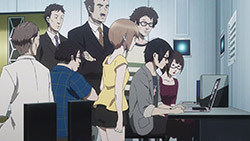 |
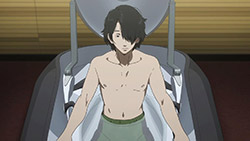 |
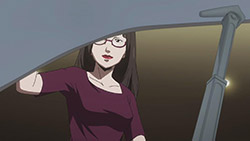 |
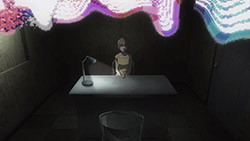 |
 |
 |
 |
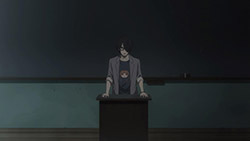 |
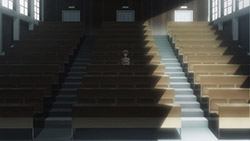 |
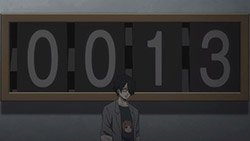 |
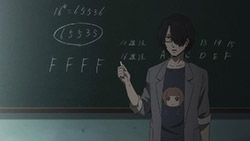 |
 |
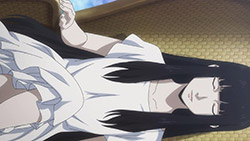 |
 |
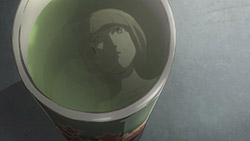 |
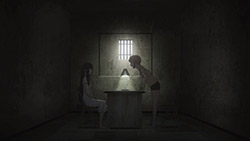 |
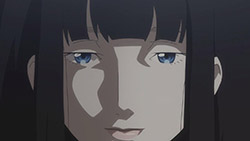 |
 |
 |
 |
 |
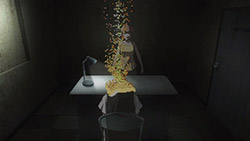 |
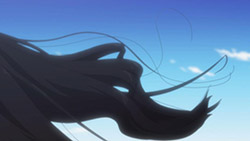 |
 |
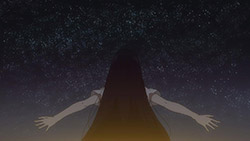 |
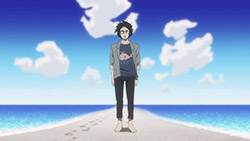 |
 |
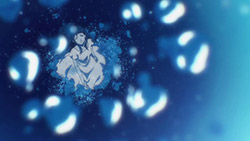 |
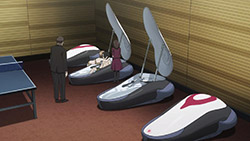 |
 |
 |
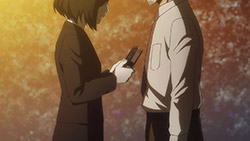 |
 |
「紫苑色の真実」 (Shioniro no Shinjitsu)
“Aster-Coloured Truth”
Symbolism this week! Er, I think. Look, tropical resort vs interrogation room. That probably means something? Moe’s feeling insecure and has lots of questions, while Souhei’s relaxed and—why am I pretending you folks can’t works this stuff out yourselves? Since most of the episode was spent inside the holodeck coffins, everything is suitably abstract. Interpret as you will! Do you think that Magata Shiki just really wanted a jellyfish aquarium when she was a kid but didn’t get one so is now subconsciously lashing out? Sure, why not? No bad ideas here.
Literature majors going into apoplexy aside, this week’s episode was supposed to be the confession episode, in which the culprit spills the beans in front of the detective and we get an understanding of the former’s true depravity and/or desperation. The facts of the case we have here I found straightforward. The Miki = Shiki reveal was no great suprise once it was established that Shiki had a daughter. I was also already used to thinking in hexadecimals, because of RPGs with stat caps of 255. I was up to speed with the ‘how’ of the case, and didn’t need the recap like Moe. But, as I noted last week, I don’t consider the mechanics of the murder to be the main point of Subete ga F ni Naru, but rather the motives. That’s where I’m still a bit perplexed, because I haven’t really been able to process why Shiki killed her parents, killed her daughter, and then killed her lover. Or rather, some reasons are given, but I do not find them satisfactory. This is even before we note that most of the ‘reasoning’ is pure conjecture. As Hyouka taught us, making assumptions about the values of others and treating it as fact is hubris. Shiki’s daughter is no longer around to tell her side of the story. That’s one of the disadvantages to being dead.
Yes, I know Souhei keeps saying that Magata Shiki is a genius whose mind works in ways beyond mortal understanding blah. But is that really how she has been shown? I know that Moe is really good at maths because she does maths fast. Okay, easy, got it. But Shiki? She’s been shown to be a nihilistic psychopath; does that make her a ‘genius’? Perhaps it’s an issue with presentation. Take the Souhei/Moe dichotomy. They’re the Holmes/Watson analogue when it comes to the mystery, which is fine; the detective requires someone to explain his solutions to. What take issue with is their positions regarding Magata Shiki. Obviously, Souhei is pro-Shiki and Moe is anti-Shiki, if one can frame it so simply. But why is Souhei presented as the cool, logical one while Moe plays the heated, emotional one? It makes Moe look irrational, and does a disservice to her larger point—that Shiki has no point. Why does the daugher have to kill her parents? Why are the daughter’s choices only to kill or be killed? What about Shiki’s 15 years of child abuse?
I thought meeting Shiki would finally convince Souhei that he’s dealing with a psycho, but I’m afraid he’s been dragged under by the sociopathic charm as well. Unlimited virtual world is nice and all, but with Shiki? Maybe I’m just no ‘genius’, but that sounds distinctly… unpleasant. Well, we still have an episode left, so maybe there’s still time for a change of heart. Somehow, though, I doubt. Still, I’d like to see some loose ends wrapped up. I wonder if Shiki will manage to wriggle free of her karma again? And if she does, what point will that be making?

But Shiki? She’s been shown to be a nihilistic psychopath; does that make her a ‘genius’?
There are two things here that must be considered:
a) the former is completely independent of the latter.
b) ‘genius’ is really hard to demonstrate without falling into Charlie & The Chocolate Factory syndrome whereby you start breaking out fantastical things; doubly so when your ‘genius’ is not on screen for the vast majority of the show.
This show is more grounded in reality so fantastical things are off the table. Instead, to compensate for the character not being present you’ve got the characters who work around Shiki to tell you the incredibly difficult but not that far above the tech curve things she’s done; like contracting for Nasa, writing a Siri/Cortana-esque operating system largely solo, creating a semi-autonomous robot, developing a next stage VR system, etc…
Moe plays the heated, emotional one?
Moe is the character for whom losing her parents was a tragedy – placing her in direct opposition to Shiki’s point of view – and who has an emotional attachment to Souhei as a protector that makes her incredibly scared of losing him.
She’s Shiki inverted and that’s why the two get confrontational.
Why does the daugher have to kill her parents?
Because that was Shiki’s world view up until the point where her daughter killed herself (if we take Souhei’s interpretation of events at face value). The more interesting question is what was done to her that caused her to come to that POV.
1. My point is that Souhei considers Shiki a genius not just because she is very smart, but because her mind works in different ways to ours, and her values are on a higher level than ours. That is, she is ubermensch. But I can’t really see her reasoning, and what we’ve been given of it hasn’t been satisfying to me.
2. I’m not questioning why Moe was emotional; I agree with your points. What I take issue with is how she is played against Souhei/Shiki. I think Moe actually has very reasonable points, but the narrative does not frame her as acting by ‘reason’. Her side needs better advocacy.
3. Not disagreeing with you here either. Right now, I still feel that Shiki is without justification. And ‘we can’t possibly understand how her superior thinking’ is not something I can just accept either.
1. It seems to me that Shiki (four seasons) embodies more the homophone “Shiki” (corpse demon). Not that she’s a vampire or what, but that she doesn’t act or think like a functional human does. I feel like her character seems to be related to “Detachment” in Buddhism—that is, to one of the Four Noble Truths. Shiki thinks life is a burden, and in Buddhism, to end suffering, one must detach/unattach (release) himself/herself from desires of things and etc. To be able to do that makes someone…like a “transcended being.” Shiki seems/tries to be emotionally uninvolved with others though, so while she is “enlightened” in a way, it (physical detachment) is not what Buddhism primarily seeks. Which I guess makes her more out of the plane to Souhei than ever.
2. I agree. While Moe is emotional, she can also be very reasonable at the same time. I think her character is being downplayed in every match-up with Souhei/Shiki. Of course, there’s the experience, knowledge, and reasoning to factor in, but her perspective needs some consideration too.
I find Souhei’s rambling about how they never had to match up to the god-tier prowess of Shiki’s ‘genius’ particularly revealing about his own weakness as an individual. From the very beginning, this is a character that’s said that he wants to escape from the real world (not exactly Shinji Ikari’s brand of cowardice in always just running the hell away, but it’s the same basic foundation in that he just doesn’t like the world and wants it all to stop) and here we have Shiki who, to the best of her ability, created a ‘world’ that more or less accomplishes that. Hell, Souhei himself said he could spend the rest of his life there.
I get the impression that Magata Shiki comes across to Souhei as near a god-like figure. And how in the world could anyone actively try to sabotage their own dream and take down their own god? Not Souhei, regrettably. >__>
And, as for Shiki’s ‘reason’ for killing her parents… it’s bullshit. It just is. Killing your own flesh and blood parents for no more than some obscure reason that humans, in Shiki’s mind, only live fifteen years and that she has to engage in some neverending cycle just ’cause or because of “freedom” or something?
Mhmm, okay. Total coincidence that all the people whom she killed are the ones who knew about Shiki conceiving a child with her own uncle when she was only thirteen years old. Got it.
Hell, she even said that she was going to “come for Souhei” someday. Hrm… whatever could that possibly mean? Might want to think about buying a gun for some personal protection there, sensei. Just sayin’
Sigh.
Ultimately, and obviously I don’t think Magata Shiki is a genius. In her heart of hearts, I just think her one, much like Souhei, who wants to escape from a world that she wants nothing to do with and who, perhaps more than anything else, both did and didn’t want to be understood, hence why she kills anyone who gets close and yet at the same time leaves open the possibility for others to glimpse into her mind. Contradictory, much? Sure, but then we are dealing with a nihilistic psychopath here, not matter what kind of thinly veiled justification Souhei gives it.
“there are always two of them, master and apprentice…”
about the only thing needed clarification now, namely whether body was daughter or mother
in the hindsight, it was obvious – removing hands from daughter’s body was needed to stop police from discovering that she was NOT Magata Shiki (whose fingerprints doubtlessly were in archives of the case from 15 years ago), and removing legs was to conceal obvious purpose of removing hands…
In the end, there is one lesson from the story – and quite obvious one “dont let the psychopath who have already killed 2 people design operating system on which entire your lab runs, moreover, dont use electronic locks and doors where simple locking bar from outside would suffice!
“what could possibly go wrong?”
Asides from the overall ‘WTF’ sort of reactions I’m having as a response to the explanations given in this episode (so basically Shiki’s entire existence, my overwhelming feeling towards this is that of feeling sad for for Shiki’s daughter. That poor child never really had a chance, did she? I wish that at some point in her short (and no doubt twisted) life she had some sort of happiness. Not very likely, but still.
Regarding the Shiki=Miki things, I can’t help but wonder if her aunt was complicit in any way…as you’d imagine that she’d know that Shiki had no sister, but she acted like the presence of ‘Miki’ was perfectly normal and expected. And somewhat tangential to that, now I’m thinking back on the previous episodes, for someone so obviously one-track-minded and permanently enigmatic, Shiki did one hell of a good job in acting like a ‘normal woman’.
Considering her pseudo-multiple personality, I don’t think it would be that hard for her to play the role of a “normal woman”. Also, I think it’s more likely that the sister Miki does exist, she just wasn’t ever on her way to the lab. If your plan to escape requires you to impersonate another person, you should probably make sure it isn’t someone whose existence can easily be disproven. IIRC, the only person who “knew” Miki was visiting was the director, who was clearly complicit. Everyone else just got that info from him.
Hmm, that’s a point. That does make me wonder though what the ‘real’ Miki thought of everything that happened before, and what she’d think of everything that happened now. Not to mention where she is now, and what her upbringing was like relative to Shiki’s….
Now we know why the supposed long time resident of America Miki sounded like a Japanese person speaking English (other than the lack of English speaker sounding English in anime)
Dr Magata Shiki killed her parents, not just because some obscure reason, they were against her giving birth to her daughter! Later her daughter, only became the victim, because after the conversation she had with Nishinosono, she began to wonder what it would be like to act on her own will instead of the will of her mother…
Magata Shiki had planned on her daughter to kill her because that would act as a redeeming moment! She the one who had killed her parents would then die at the hands of her daughter… As Magata Shiki said it herself, it would act as a normal cicle in life; also we can extrapolate that this would allow her daughter to escape from the locked room, much like it allowed Magata Shiki to escape.
I can’t really accept that that a perpetual cycle of parricide is natural for humans; Shiki doesn’t really give thorough reasoning for it either. I should also note that Shiki was in that room willingly, and she was found not guilty of murder. If anything, her daughter was the most trapped, indoctrinated to killing her mother for her entire life.
Eh, the concept of killing your parents (or, for that matter, murder in general) being abhorrent is a societal construct rather than a biological one. She clearly doesn’t care all that much about social mores, so I don’t see it as a stretch that she would think parricide is natural. It isn’t uncommon in nature for the cycle of life to include killing off the older generation as the younger one grows up and takes control. The common idea that “no parent should have to bury their child” indicates that the younger generation should outlive the older one; in her case, she just happened to help her parents along on their way to the grave.
You’re absolutely right, it is not natural for us normal humans, but for Magata Shiki an idea like that would seem natural… The mother withers for the sake of the child!
I think that the greatest hardship with this, is to put oneself in Shiki’s warped mind, which i agree is not the easiest of processes. Also that explanation from the sensei (people only live for fifteen years, at which point they kill their parents and become fourteen) didn’t help much because the only example that we had of that was Shiki… I could go for the philosophical approach, that when we reach maturity (in a biological way) we begin to kill the idea of our parents, but still…
The funny thing in all of this is that people put Nishinosono down for being too spoiled and temperamental, but we the viewers, the normal humans who watch this show, are in fact experiencing her point of view when it comes to anallysing the murder :v
@SK: So, essentially, your argument is that Magata Shiki leans more towards being consumed by her biological instincts rather than paying much, if any heed to the societal norms that the overwhelming majority of humans would agree as being essential to having a modestly peaceful, respectful society?
Setting aside the natural contradiction that infers regarding Souhei’s dubbing of Shiki as a “genius,” there’s another contradiction in your argument in that, even if what you were saying were true, it serves no purpose. Shiki would’ve killed her parents purely for the sake of killing her parents because that’s just how she believes people should behave, which is unimaginably stupid.
I stand by my belief in that, as far as being a “motive” for Shiki’s murders, that is nothing but a thin veil of bullshit. I don’t buy that for one second. She killed her parents, her incestuous uncle and even her fifteen-year old daughter for a much more human reason; in that Magata Shiki cannot stand having anyone from a world she despises come to understand her, and yet at the same time she can’t help but leave the proverbial door open towards people at least having the opportunity.
One could say, ultimately, that she’s just killing time. Who knows? Maybe she is.
@Ryan
Judging by her interest in having sex with her uncle, she seems aware, though not overly concerned, about societal norms. To me, it seems like she isn’t going to go out of her way to break those norms without a reason (not an anarchist), but has no qualms about crossing those lines if she does have one. Her motive certainly seems to be her parents’ refusal to accept her relationship/child with her uncle; once she reached that point, though, I don’t think she felt bound by the social concept that parricide is immoral, especially given that it isn’t unusual in nature. If this relationship never occurs, I don’t think she goes on to kill them for the lulz; however, if a different situation had come up where she felt her parents were restricting her, and the only way for her to gain her freedom was to kill them, she probably would have done the same thing.
My main point is that, unlike the majority of society, Shiki doesn’t restrict her biological instincts by following social norms specifically designed to do so. The rules of society are only deterrents put in place to prevent people from committing certain acts that disrupt society; for most people, the potential cost is high enough that they aren’t willing to take that risk. However, if someone doesn’t care about the punishment, social norms can’t actually stop him/her from doing it. If Shiki desires her uncle sexually, the taboo of incest doesn’t stop her from sleeping with him. If she must kill her parents so that she can continue that relationship and have the baby, the taboo of parricide/murder doesn’t stop her. She’s willing to abide by the rules of society, so long as they don’t restrict her from doing what she wants. I understand that the point of having rules is to restrict actions that harm society as a whole, but nothing we’ve seen from her shows that she would care about such a thing.
Going by their final conversation, Shiki killing her uncle seems to be her way of setting him free from the chains of society, since he couldn’t quite free himself like she did.
@SK: I understand what you’re saying, but I think you’re missing the forest for the trees here. Ultimately, the question that stems from all of that is the why? Why does Shiki seem to actively go out of her way to commit acts that stand in stark repudiation of some of society’s most basic and essential norms? And what is this “freedom” that, supposedly, she would seem to want so much?
Freedom, in its purest sense as I would seem to understand it, is essentially the ability to do whatever you want, whenever you want and however you want to. Of course that doesn’t mean you’ll always accomplish said things, but the idea is is that you have the ability to have at it without any undue restrictions or rules imposed on you.
If that’s the case, then that obviously explains the reason why Shiki went out of her way to create an entirely virtual world. If you don’t like the world you’re living in, then just create another one, amirite?
However, if that’s true, then Shiki’s actions don’t make sense. Why would she still stay in a world she despises when she could just flee into her own self-made virtual world the moment she completed it?
The answer, disturbing as it is, is that Shiki would never do something like that, ever. The “freedom” she wishes for is found in the act of rebelling against society’s norms, like a child who gets a thrill out of acting out against his/her parents. That’s why she would never flee into a virtual world forever, because it would obviously take away the opportunity to ever commit such acts ever again. That’s why she kills her own flesh and blood; not only because she can’t stand the idea of people from a world she despises intruding upon her mind, but because the act of killing one’s own family is about as taboo as you can get.
Of course, all of that is absolutely insane and reflective of the truth that Magata Shiki is a nihilistic psychopath who would kill anyone and do anything so long as it serves her purposes.
Please, let’s not treat her as being even remotely like a normal, sane person. She had no genuine feelings of love for her uncle in the slightest. He was as much a tool to her as everyone else in her life; means to an end, nothing more.
https://randomc.net/image/Subete%20ga%20F%20ni%20Naru/Subete%20ga%20F%20ni%20Naru%20-%2010%20-%20Large%2007.jpg
https://randomc.net/image/Subete%20ga%20F%20ni%20Naru/Subete%20ga%20F%20ni%20Naru%20-%2010%20-%20Large%2012.jpg
Virtual reality drinks? Yes, please! I would like to try that. Talk about taking what flavor you should drink literally.
On another note, it is hard to truly understand Shiki’s motives unless more information about her is revealed. How was Shiki treated as a child by her family. What made her like her uncle in a romantic way? I don’t know if we will ever find out. She was an intriguing character though.
Those drinks gave me the creeps.
Saikawa is insane.
Sensei wishes he were Magata. I bet he secretly both worships and envies her.
I must say, reading the discussion page about this episode on reddit is an utter joy. It’s also contains great potential explanations for the many loopy-loop-holes this episode presented.
What I’ve always wondered was… Why was was the psychotic, schizophrenic manslaughterer “Magata Miki” allowed to live in a mansion-like laboratory and write code for her own security systems (that included security cameras) again?
One must remember that Shiki was found innocent of killing her parents. Also, the laboratory pretty much revolved around her. Her uncle was the director, and her programming skill was what was desired.
Wasn’t it NGRI or something along those lines? Legally she isn’t culpable for the murder, but that doesn’t really change the fact she killed them. Especially if she’s a genius programmer, I wouldn’t recommend letting her develop the security system without some kind of external backup involved.
The details of the trial is not something we’re give much information about, but since she was neither gaoled nor institutionalised we have to give her the benefit of the doubt. And again, the director was her uncle, and she locked herself in her room willingly. Shiki simply turned out to be more twisted than anyone imagined.
Can someone explain why both Shiki and her daughter were so interested in Saikawa-sensei, apart from this being a harem show?
Well, the daughter was ‘brainwashed’ by Shiki, no? Not to mention being brought up in a room with only that brainwasher and their robot somewhat limits your pool of possible love interests, so to speak. So if Shiki had this interest in Saikawa, and the daughter was meant to impersonate her later on, it would make sense that the daughter displays the interest too.
The daughter has never met Souhei. Shiki is probably interested in him becaues they share some similar, unusual values.